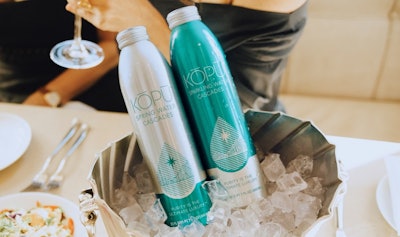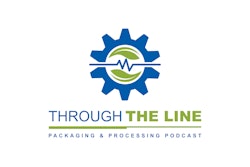
Faced with growing pressure to reduce single-use waste, luxury hotel brands like Hyatt, Hilton, Marriott, and The Ritz-Carlton are turning to more sustainable solutions that don’t compromise on elegance. Kopu Water, a premium American brand founded by Justin and Mindy Mahy, is helping them make the shift by offering a bottled water program that replaces glass packaging with lightweight, recyclable aluminum bottles and pairs it with a built-in recycling system.
“Hospitality bottled water over the last 40 years has been dominated by three imported European brands, all bottled in a different hemisphere and shipped to the U.S. in glass bottles, most of which are destined for community landfills after consumption,” says Justin Mahy.
 | Read about another company, Boomerang Water, that provides reusable bottles along with in-house bottling equipment for resorts and other closed-loop systems in this article, “Disruptive Bottling System Closes the Loop” |
Despite being theoretically recyclable, glass presents significant challenges, especially in hospitality environments, Mahy explains. It has low residual value and often requires government regulation to incentivize recovery. Only a small number of states have effective programs in place, and even then, glass must be sorted by color and kept free from contamination. Its weight adds to transportation emissions and costs, while breakage introduces safety and logistical concerns.
Recognizing these limitations, Kopu identified aluminum as a better option, one that meets both sustainability and operational goals. “We chose aluminum due to market economics and the recycling infrastructure that is built around this material,” Mahy explains. “Aluminum scrap is worth $1,000 to $2,000 per ton, where empty plastic bottles are worth a fraction. Relatively high residual value significantly increases recycling rates as aluminum wholesalers want this material back.”
In addition to its economic and recycling advantages, aluminum offers a major benefit in weight. Kopu’s bottles weigh 80% less than equivalent-sized glass bottles, resulting in proportionately fewer greenhouse gas emissions during transport and handling.
To ensure the packaging aligned with the elevated standards of its hospitality clients, Kopu partnered with Trivium Packaging to create a bottle that blends performance with premium design. Made with 25% recycled content, the aluminum bottle features a distinctive “soft shoulder” silhouette that fits seamlessly into fine dining settings and luxury guest rooms.
 | Read this related article, “Five Regional Water Brands Add Aluminum Bottles to Lineup” |
But manufacturing the bottle did not come without its obstacles. “Creating a bottle that provides the premium look and feel needed for Kopu’s product, and balancing this with the limitations of the production process, is a challenge,” says Chas Aylsworth, director commercial at Trivium Packaging. “For the production process of these bottles, the aluminum is much thicker than that of a traditional soda or sparkling beverage can. While still lightweight, the thicker material makes it much more difficult to bend and form the metal, especially in the creation of the reclosable threads.”
To complement the bottle’s form, Trivium uses a dry-offset printing process. “The technique allows for consistent print quality with vibrant colors and intricate details,” Aylsworth explains. “Our process is designed to be eco-friendly, with reduced waste and the use of safe, non-toxic inks.”
 Custom-branded aluminum recycling bins from Kopu support hotel sustainability goals while educating guests on the circular journey of every bottle.Trivium Packaging
Custom-branded aluminum recycling bins from Kopu support hotel sustainability goals while educating guests on the circular journey of every bottle.Trivium Packaging
Kopu tracks the weight of aluminum delivered and collected at each property, calculating capture rates that are shared with clients. This data helps them optimize operations and move toward zero waste beverage packaging. “One client, a 500-room resort in Miami, calculated that they eliminated 52 tons of landfill waste in a single year by replacing their imported water brands with Kopu,” Mahy shares.
Hotel and restaurant teams have responded with enthusiasm. “Until now there has been a sense of disillusionment about the amount of landfill waste created by their operations and a powerlessness to effect change,” Mahy says. “Kopu is providing a turn-key solution that does not take additional resources and makes the simple switch, from glass packaging that is likely to end in a landfill, to aluminum packaging that is guaranteed to be recycled.” PW

























